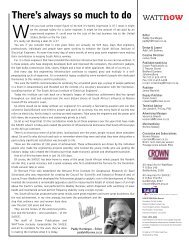Cut electricity consumption with automation - Watt Now Magazine
Cut electricity consumption with automation - Watt Now Magazine
Cut electricity consumption with automation - Watt Now Magazine
Create successful ePaper yourself
Turn your PDF publications into a flip-book with our unique Google optimized e-Paper software.
<strong>Watt</strong>’s Says<br />
4. Let us take larger environmental losses into consideration. In a<br />
system <strong>with</strong>out any or minimal environmental losses, the regulator<br />
can easily keep the set point nearly constant against temperature<br />
fluctuations. However, if the geyser is not adequately insulated and<br />
the environmental losses are very high, then the regulator is unable<br />
to keep the setpoint nearly constant. Electrical engineers include<br />
environmental losses in terms of an equivalent added thermal load<br />
resistance when designing a regulator. However, every regulator<br />
works only <strong>with</strong>in it design range and if environmental conditions<br />
(and thus the equivalent thermal load due to inadequate thermal<br />
insulation of the geyser) exceed the designed capabilities of the<br />
regulator, then we are essentially confronted <strong>with</strong> an unregulated<br />
system. In such a case, I do agree that it is best to disconnect the<br />
geyser in order to save <strong>electricity</strong>.<br />
5. I did not say anything about the actual setting of the thermostat.<br />
It is true that one can save some <strong>electricity</strong> by setting the<br />
thermostat to a temperature lower than 70 degrees C, such as<br />
55- to 60 degrees C.. If the set point is lower, then the temperature<br />
differential to be traversed from a low ambient is smaller, hence<br />
the <strong>electricity</strong> <strong>consumption</strong> is somewhat lower, but only whenever<br />
I take hot water out of the geyser which needs to be re-heated<br />
to set point. I have done so in my own house. Incidentally, my<br />
geyser has a factory-installed insulating cover and I also have an<br />
additional Aerolite glass fibre cover<br />
Best regards,<br />
Prof. Ian Shaw<br />
Pr Eng Prof Ian Shaw, Dipl.Ing.(Elect Eng (Bpest), MA Psych<br />
(California), Dr Eng (RAU).<br />
[Professor Shaw then adds to the debate]<br />
Dear Paddy,<br />
Here is an independent opinion by one of my best students (MSc<br />
(RAU) cum laude). He’s an absolute genius of an engineer working<br />
in the UK.<br />
Dear Ian<br />
The only way you are going to stand any chance of convincing these<br />
chaps is by doing a comparative worked numerical example for each<br />
case, making reasonable assumptions for all variables. The key value<br />
is what the thermal losses to the environment are, and I am sure that<br />
even the civil engineers would agree that for a zero loss system it’s<br />
more efficient to leave the geyser on all the time. I said to you before<br />
that the key issue is how efficient the thermal insulation of the geyser<br />
is. You ought to be able to derive this value by an experiment: Leave<br />
your geyser to heat up to nominal value and then switch it off and<br />
measure the water temperature decrease at regular time intervals at<br />
a tap closest to the geyser. Draw a graph of temperature vs time and<br />
use this as the input to a little thermostat simulation program you<br />
can write - or do it in a spreadsheet. You might find the results quite<br />
surprising, for I’m not that convinced that geysers are that effectively<br />
insulated, but then the last time I looked at a geyser in SA was 30<br />
years ago and it was hardly insulated at all. Geysers here in UK are<br />
called ‘hot water cylinders’ and are generally smaller than SA geysers.<br />
They usually are made of copper or fibreglass and have a layer of hard<br />
foam about 50 mm thick (or a woolly anorak thingy...) around them<br />
for insulation. Let me know the outcome. Don’t get too wet or scald<br />
yourself!<br />
Cheers<br />
John<br />
[I think this is probably the time to end this debate. After all is<br />
said and done, I would like know: Does switching off your geyser for<br />
a few hours a day save <strong>electricity</strong>. Yes or No. So far the only answer<br />
seems to be “Maybe”. I asked one of my colleagues at the office to<br />
read these pieces and she said: “I really don’t know what all thefuss<br />
is about.” I asked her why and she said the answer is so simple: “Why<br />
not just turn down the meter.”. I shook my head but didn’t try to<br />
explain. Editor]<br />
Ian Shaw<br />
July 2008<br />
21

















